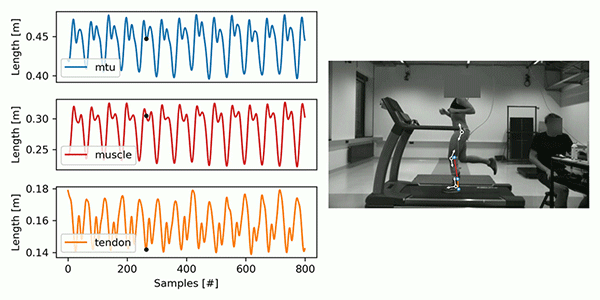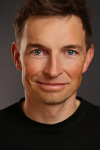Difference between revisions of "Wearables for Sports and Fitness Tracking"
From iis-projects
(→Christoph Leitner) |
(→Point of Contact) |
||
| (34 intermediate revisions by the same user not shown) | |||
| Line 1: | Line 1: | ||
| + | [[Image:running.gif|right|test]] | ||
| + | |||
| + | |||
==Wearables for Sports and Fitness== | ==Wearables for Sports and Fitness== | ||
| + | '''Wearable technology''' is rapidly growing in popularity within the sports and fitness industry. Fitness trackers and smartwatches allow for easy tracking and monitoring of key metrics such as heart rate, steps taken, and calories burned, aiding users in setting and achieving fitness goals, and participating in online challenges. These devices can even create personalized training programs based on data collected. | ||
| + | |||
| + | '''In sports''', wearables provide athletes with real-time feedback on performance and technique, helping to improve competitive skills. Additionally, coaches gain new opportunities to monitor and analyze training data, leading to improved training management for athletes. | ||
| + | |||
| + | Moreover. wearable technology can offer a range of benefits '''for rehabilitation'''. Utilizing devices such as exoskeletons, smartwatches and smart clothing, individuals can track their progress and receive targeted exercises and feedback to aid in their recovery. Additionally, wearables can be used to monitor and manage chronic conditions, such as chronic pain, giving patients the information they need to make informed decisions about their treatment. | ||
==Our Activities== | ==Our Activities== | ||
| + | We are primarily interested in the '''design and hardware implementation of wearables''' for sports, fitness, and quality of life applications. However, to ensure high performance, we need to think '''along the entire hardware-software stack''': | ||
| + | |||
| + | * '''Architecture''': The development of sensors for '''''onlife sensing''''' is driven by the requirement for "disappearance". This means that the integration of heterogeneous devices must take place in ever smaller physical volumes. | ||
| + | |||
| + | * '''Hardware-software codesign''': The development of performance-aware algorithms and their use in our PULP processing architecture enables energy-aware and memory efficient operation. | ||
| + | |||
| + | * '''Multisensory''': We are working beyond traditional heart rate monitoring on combined sensor networks to investigate new quality of life and sports applications. | ||
| + | |||
| + | ==Contact== | ||
| − | |||
{| | {| | ||
| Line 10: | Line 26: | ||
===[[:User:Cleitne | Christoph Leitner]]=== | ===[[:User:Cleitne | Christoph Leitner]]=== | ||
* '''e-mail''': [mailto:christoph.leitner@iis.ee.ethz.ch christoph.leitner@iis.ee.ethz.ch] | * '''e-mail''': [mailto:christoph.leitner@iis.ee.ethz.ch christoph.leitner@iis.ee.ethz.ch] | ||
| − | * '''phone''': +41 76 686 1179 | + | * '''phone''': +41 76 686 1179, '''whatsapp''': +43 664 15 63 900, '''skype''': chu.leitner |
| − | |||
* '''Office''': ETZ J65 | * '''Office''': ETZ J65 | ||
|} | |} | ||
| Line 30: | Line 45: | ||
category = Available | category = Available | ||
category = Digital | category = Digital | ||
| − | category = Wearables | + | category = Wearables for Sports and Fitness |
suppresserrors=true | suppresserrors=true | ||
ordermethod=sortkey | ordermethod=sortkey | ||
| Line 36: | Line 51: | ||
</DynamicPageList> | </DynamicPageList> | ||
| + | <!-- | ||
===Projects In Progress=== | ===Projects In Progress=== | ||
<DynamicPageList> | <DynamicPageList> | ||
category = In progress | category = In progress | ||
category = Digital | category = Digital | ||
| − | category = Wearables | + | category = Wearables for Sports and Fitness |
suppresserrors=false | suppresserrors=false | ||
ordermethod=sortkey | ordermethod=sortkey | ||
| Line 49: | Line 65: | ||
category = Completed | category = Completed | ||
category = Digital | category = Digital | ||
| − | category = Wearables | + | category = Wearables for Sports and Fitness |
suppresserrors=true | suppresserrors=true | ||
</DynamicPageList> | </DynamicPageList> | ||
| Line 61: | Line 77: | ||
order=ascending | order=ascending | ||
</DynamicPageList> | </DynamicPageList> | ||
| + | --> | ||
Revision as of 22:08, 29 January 2023
Contents
Wearables for Sports and Fitness
Wearable technology is rapidly growing in popularity within the sports and fitness industry. Fitness trackers and smartwatches allow for easy tracking and monitoring of key metrics such as heart rate, steps taken, and calories burned, aiding users in setting and achieving fitness goals, and participating in online challenges. These devices can even create personalized training programs based on data collected.
In sports, wearables provide athletes with real-time feedback on performance and technique, helping to improve competitive skills. Additionally, coaches gain new opportunities to monitor and analyze training data, leading to improved training management for athletes.
Moreover. wearable technology can offer a range of benefits for rehabilitation. Utilizing devices such as exoskeletons, smartwatches and smart clothing, individuals can track their progress and receive targeted exercises and feedback to aid in their recovery. Additionally, wearables can be used to monitor and manage chronic conditions, such as chronic pain, giving patients the information they need to make informed decisions about their treatment.
Our Activities
We are primarily interested in the design and hardware implementation of wearables for sports, fitness, and quality of life applications. However, to ensure high performance, we need to think along the entire hardware-software stack:
- Architecture: The development of sensors for onlife sensing is driven by the requirement for "disappearance". This means that the integration of heterogeneous devices must take place in ever smaller physical volumes.
- Hardware-software codesign: The development of performance-aware algorithms and their use in our PULP processing architecture enables energy-aware and memory efficient operation.
- Multisensory: We are working beyond traditional heart rate monitoring on combined sensor networks to investigate new quality of life and sports applications.
Contact
Christoph Leitner
|
Projects
All projects are annotated with one or more possible project types (M/S/B/G) and a number of students (1 to 3).
- M: Master's thesis: 26 weeks full-time (6 months) for one student only
- S: Semester project: 14 weeks half-time (1 semester lecture period) or 7 weeks full-time for 1-3 students
- B: Bachelor's thesis: 14 weeks half-time (1 semester lecture period) for one student only
- G: Group project: 14 weeks part-time (1 semester lecture period) for 2-3 students
Usually, these are merely suggestions from our side; proposals can often be reformulated to fit students' needs.
Available Projects
- Integrating Ultrasound Technology into a Fitness Tracking Device (1M, 2 B/S)
- ML based Quantitative Movement Analysis on a Portable IoT Camera (1-2S/B)
- Multisensory system for performance analysis in ski jumping (M/1-2S/B)
- Skin Coupling Media Characterization For Fitness Tracker Applications (1 B/S)
- Smart Goggles for Visual In-Action Feedback in Ski Jumping (1 M 1-2B/S)
- Wireless In Action Data Streaming in Ski Jumping (1 B/S)

